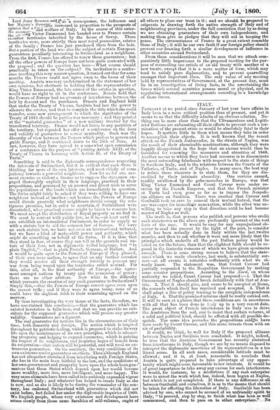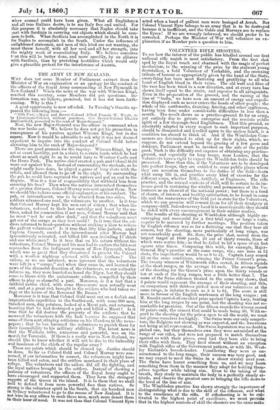ITALY.
PROBABLY at no period since January of last year have affairs in Italy been in a more critical position than at present, and yet it seems to us that the difficulty admits of an obvious solution. No- thing can be more clear than that the Ultramontane and Legiti- mist factions are exhausting all their efforts to prevent such a ter- mination of the present crisis as would be absolutely fatal to their hopes. It matters little to them what means they take in order to accomplish their objects. It is well known that the reoent attack on the French Ambassador, in the streets of Naples, was the result of their abominable machinations, although they were happily disappointed in the hope that an excuse would then be furnished for renewing the massacres and atrocities of 1848. Another means to which they have had recourse is to disseminate the most astounding falsehoods with respect to the state of things in Southern Italy, and to the relations between the Courts of the Tuileries, of Turin, and of Naples. In many cases, the best way to refute these rumours is to state them, for they are dis- credited by their intrinsic absurdity. One curious canard, readily swallowed by the gobe-mouches in Europe,. was that King Victor Emmanuel and Count Cavour were under co- ercion by the French Emperor, and that the French minister at Turin had even gone so far as to impose the Neapoli- tan alliance on Sardinia. There was another that Cavour and Garibaldi took no care to conceal their mutual hatred, that the one was eager for immediate annexation, while the other was un- willing to take any step in that direction until he had become master of Naples as welL The truth is, that persons who publish and persons who credit such statements as the above are profoundly ignorant of the real facts ef the case. It would be easy for any unprejudiced ob- server to read the present by the light of the past, to consider what has been actually done in Italy within the last twelve months, and then to ask whether it were not more likely that the principles which underlie all the past Italian policy would be acted on for the future, than'that the slightest faith should be re- posed in the fantastic rumours of which we have given specimens enough. There is some strong reason to believe that the state- ment which we made elsewhere, last week, is substantially cor- rect—at all events it coincides sufficiently with what we al- ready know. The statement was, that Count Cavour had partially responded to the Neapolitan Government by making some counter propositions. According to the Nord, on whose authority we relied, Count Cavour had proposed :—l. That the Government of Naples should break definitively with that of Aus- tria. 2. That it should give, and cause to be accepted at Rome, the counsels which itself has received and accepted. 3. That it shall adopt a line of policy tending to the complete independence of Italy. 4. That the promised reforms shall be really carried out. It will he seen at a glance that these conditions are in accordance with all that has been done in Italy up to a very recent date. The great object of French interference in Italy was to drive the Austrians from the soil, and to insist that certain reforms, of a solid and political kind, should be effected with all possible de- spatch. The same idea pervades the propositions saidlto have been made by Count Cavour, and this alone invests them with an air of probability. It would, we think, be well for Italy if the proposed affiance between Naples and Sardinia were concluded. It might, indeed, be true that the Austrian Government has recently abstained from interference in Italy, though we are by no means disposed to interpret the diplomatic assertions of its representatives in a too literal sense. In all such oases, considerable latitude must be allowed ; and it is, at least, reasonable to conclude that Austria is quite prepared to take advantage of any oppor-. tunity whioh might seem favourable to her interests. It would be of great importance to take away any excuse for such interference. It would, for instance, be a misfortune if any rash enterprise were to arrest the work which has, indeed, been begun at Naples, but which is not yet completed. If there is any difference at all between Garibaldi and ourselves, it is as to the means that should be taken for effecting the liberation of Italy. Garibaldi has been advised by one, who cannot be accused of an unfriendly spirit to Italy, "to proceed, step by step, to finish what has been so well commenoed, and then to pass on to other enterprises." No.
wiser counsel could have been given. What all Englishmen and all true Italians desire, is to see Italy free and united. For this purpose it is absolutely necessary that Naples should take part with Sardinia in carrying out objects which should be com- mon to both. What Sardinia has accomplished in the North it is for Naples to accomplish in the South. Under the influence of enlightened statesmen, and men of this kind are not wanting, she must throw herself, with all her soul and all her strength, into the mighty work of resuscitating Italy. We believe ourselves that this will be better done, and more speedily, by an alliance with Sardinia, than by provoking hostilities which would only give a plausible pretext for the interference of Austria.



























 Previous page
Previous page